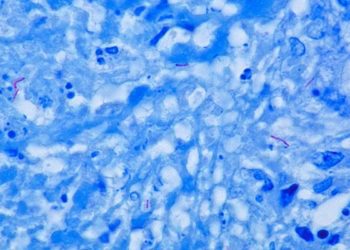Two bedaquiline-containing regimens had superior efficacy and safety profiles for treatment of rifampin-resistant tuberculosis
1. Compared to a 9-month injectable-containing (control) regimen, both bedaquiline-containing oral regimens had more favourable outcomes, such as negative cultures.
2. There were additionally less cases of hearing loss in the bedaquiline regimens compared to the control regimen.
Evidence Rating Level: 1 (Excellent)
Study Rundown: Rifampin-resistant tuberculosis (TB) threatens the global effort to eradicate tuberculosis. This randomized control trial evaluated two short regimens containing a new drug for tuberculosis, bedaquiline. The objective of STREAM stage 2 was to evaluate the 9-month bedaquiline-containing regimen compared to the 9-month regimen used in STREAM stage 1. Patients with confirmed pulmonary TB were randomized to four drug regimens: a long regimen recommended by WHO (which was terminated early), a control regimen (used in STREAM stage 1), an oral regimen containing bedaquiline, and a 6-month regimen containing bedaquiline. This study found that both bedaquiline-containing regimens had more favourable outcomes compared to the control regimen. The overall incidence of grade 3-4 adverse events was comparable between groups. There were additionally fewer cases of hearing loss with the bedaquiline-containing regimens compared to the control group. Limitations of this study include the open-label design for both investigators and participants. Nonetheless, this study provides evidence to support the superiority of bedaquiline-containing regimens against rifampin-resistant TB with reduced cases of ototoxicity.
Click to read the study in the Lancet
Relevant Reading: An all-oral 6-month regimen for multidrug-resistant TB (the NExT study): a multicenter, randomized controlled trial.
In-Depth [randomized controlled trial]: The STEAM stage 2 trial was a randomized phase 3 trial that evaluated two standardized regiments for the treatment of rifampin-resistant tuberculosis (TB). Patients were eligible if they were aged 15 years or older and confirmed pulmonary TB with evidence of rifampin resistance. A total of 588 were randomized 1:2:2:2 to either a long regimen, control regimen, oral regimen 9-month and 6-month regimen. The long regimen (n=32) was a 20-month regimen recommended by WHO, which was terminated early. The control regimen (n=202) was a 9-month regimen of high-dose moxifloxacin, clofazimine, ethambutol and pyrazinamide for 40 weeks and high-dose isoniazid and protionamide given for 16 weeks in an intensive phase. The oral regimen (n=211) consisted of the 9-month control regimen except that kanamycin was replaced by bedaquiline and levofloxacin replaced moxifloxacin. The 6-month regimen (n=143) was bedaquiline, clofazimine, pyrazinamide and levofloxacin for 28 weeks with high-dose isoniazid with kanamycin for 8 weeks during an intensive phase. The control regimen was changed in 2018 with levofloxacin replacing moxifloxacin in the control regimen given QT prolongation. The study was not blinded.
The primary outcome was negative cultures for TB without a preceding unfavourable event (death, bacteriological failure or recurrence, major treatment change) at 72 weeks. Study results demonstrated a total of 133 (71%) of 187 of the control regimen and 162 (83%) of 196 of the oral regimen had favourable outcomes (adjusted difference 11.0%, 95% CI 2.9-19.0, p<0.0001 for non-inferiority). A total of 122 (91%) of 134 of the 6-month regimen and 87 (69%) of 127 of the concurrent control regimen had favourable outcomes (adjusted difference 22.2%, 13.1-31.2). At 76 weeks, grade 3 or 4 adverse events occurred in 53% of the control regimen, 50% of the oral regimen, and 55% of the 6-month regimen. There were more cases of hearing loss in the control regimen compared to the oral regimen (9% vs 2%, p=0.0015).
Image: PD
©2022 2 Minute Medicine, Inc. All rights reserved. No works may be reproduced without expressed written consent from 2 Minute Medicine, Inc. Inquire about licensing here. No article should be construed as medical advice and is not intended as such by the authors or by 2 Minute Medicine, Inc.









